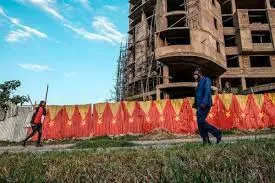The foreigners are leaving and Abi Ahmed is leading the fight Is the "Great Battle of Addis Ababa" approaching?
As events escalated and battles raged and approached the Ethiopian capital, Addis Ababa, Ethiopian Prime Minister Abiy Ahmed announced his joining the ranks of the fighters on the military fronts, and leading the battle against the Tigray Front militants, which heralds further escalation in the coming period.
Despite the intervention of many regional and international parties to negotiate and mediate, the battles that erupted a year ago between the Ethiopian Defense Forces and the Tigray Front militants, along the border strip between the regions of Tigray, Amhara and Afar, have not subsided until today.
It has intensified over the past few days, and has begun to approach at an accelerating pace from the outskirts of the Ethiopian capital, Addis Ababa, amid growing local and international anxiety and fears.
At a time when the National Defense Forces sounded alarm bells, and several countries simultaneously announced their intention to evacuate their nationals and warn their citizens against heading to Ethiopia during the coming period, Ethiopian Prime Minister Abiy Ahmed announced his going to the battlefield and leading the battle himself.
Many considered that Abi Ahmed's move was an almost clear indication of the possibility of a major war between the two conflicting sides, in the vicinity of Addis Ababa, after the armed fronts came close to encircling it.
Abi Ahmed leads the battle
With the beginning of the advance of the fighters of the "Tigray Liberation Front" and its allies, towards the Ethiopian capital, Addis Ababa, and their control over the adjacent areas and the regions a few kilometers away from them, and the security situation in Ethiopia has thus entered a critical juncture, the Ethiopian Prime Minister Abi Ahmed announced on Monday evening, 22 This November, he heads to the battlefield and leads the fateful battle himself.
"The suffering continues. We are going through this ordeal, and Ethiopia will win. We are now in the final stages of saving our country, our enemies are attacking us from outside and inside," Abiy Ahmed said in an official statement , after a meeting of the ruling Prosperity Party's executive committee to discuss developments.
He added, "It is time to sacrifice for the country, from now on I will march to the battlefield to lead the army in the defense of our country."
Meanwhile, the Ethiopian Prime Minister called on the international community, led by African countries, to stand by Ethiopia in its plight and provide support to it.
Abi Ahmed stressed earlier this month the need to make all the necessary sacrifices to save the country, especially after about 9 organizations from different Ethiopian regions and ethnicities announced their alliance with the Tigray Liberation Front during its battles in the north, which were sparked since November 2020.
In this context, he called on the Ethiopian people to take up arms, saying: "Any possible weapon must be used to repel, overthrow and bury the Tigray People's Liberation Front Death for Ethiopia is the duty of all of us."
International concern
Proceeding from its strategic importance, and for fear of the spread of battles and wars in it to the rest of the countries of the Horn of Africa, the international community's concerns have grown over the recent military and security developments in Ethiopia.
Despite international and international warnings of the country's collapse as a result of the war in it, and Washington's threat to impose more sanctions on the parties that prevent successful negotiations and fuel the conflict, this did not stop the year-long conflict.
Various international efforts have failed, such as the attempts of envoys from the African Union and the United States to broker a ceasefire, forcing many countries to withdraw their citizens, as Ethiopia has become a hotbed of tension and the future of the rapidly developing events cannot be predicted.
Earlier, European Union Foreign Minister Josep Borrell called on the warring parties to "stop fighting and refrain from all hate speech", especially after Abi Ahmed called on citizens to take up arms and prepare to fight and defend themselves and their cities.
For her part, Linda Thomas Greenfield, the US ambassador to the United Nations, said in a tweet on her Twitter page: "All parties should start ceasefire negotiations without preconditions."
But Abi Ahmed's official joining the fighting fronts indicates that Ethiopia is entering a long period of conflict and wars, which observers and analysts say may last for years, and its effects may extend to the rest of African countries.
Human rights and international organizations have confirmed that the ongoing war has claimed thousands of lives and displaced millions from their homes and cities, while thousands face the threat of starvation that threatens a humanitarian catastrophe.
Tags:
africa
africaaustralia
african countries
african migrants
african union
central african republic
east africa
forest africa
horn of africa
saharan africa
south africa
sub saharan africa
west africa






Good
ReplyDeleteGood
ReplyDeleteVery good
ReplyDeleteIt has intensified over the past few days, and has begun to approach at an accelerating pace from the outskirts of the Ethiopian capital, Addis Ababa, amid growing local and international anxiety and fears.
ReplyDeleteIt has intensified over the past few days, and has begun to approach at an accelerating pace from the outskirts of the Ethiopian capital, Addis Ababa, amid growing local and international anxiety and fears.
ReplyDeleteGreat
ReplyDeleteGreat
ReplyDelete